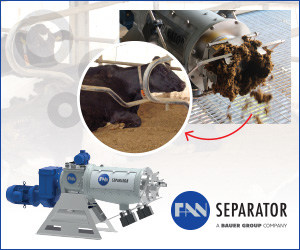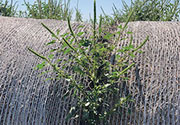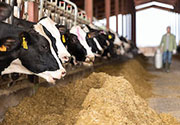| |
| |
 |
 |
| |
 |
|
@{mv_date_MMM d, yyyy}@ |
|
| |
While some categories performed better than others, in general ag equipment growth has been driven more by combine harvesters than tractors.
» Read more...
Nature Energy has established a new North American division and has set its sights on Minnesota as a location for a new facility to convert manure to natural gas and sell the remains back as fertilizer.
» Read more...
Through the investment, P&P Optima will be able to build its new food inspection technology for meat processors, which automatically analyzes food composition.
» Read more...
|
| |
|
| |

Waste Water Treatment
Turning waste water into high quality Bedding!
BENEFITS
Dry matter content up to 38% in solids when separating cattle slurry
Economical production of high-quality bedding from the manure solids already on the farm.
Easy to maintain
Housing made of cast iron
Long life of the auger due to hard metal coating
Press screw and screen basket make of stainless steel
Low energy consumption
Gearbox with NEMA flange allows convenient and cost-effective sourcing of US motors up to 15 HP
Bauer North America, bnasales@bauer-at.com +800-922-8375
» Learn More |
| |
|
| |
 Palmer amaranth is a weed whose speed and trajectory across North American farm fields, as well as its resistance to multiple classes of herbicides, is worrying growers. Originally native to the southwest U.S., the plant has since spread up to the Midwest and Canada. And one of the ways through which the weed is spreading is in contaminated manure. When cows feast on weed seeds, this can result in Palmer invading fields. Now, researchers and educators in Minnesota are working on spreading awareness about this issue, as well as finding mitigation options.
» Read more...
Palmer amaranth is a weed whose speed and trajectory across North American farm fields, as well as its resistance to multiple classes of herbicides, is worrying growers. Originally native to the southwest U.S., the plant has since spread up to the Midwest and Canada. And one of the ways through which the weed is spreading is in contaminated manure. When cows feast on weed seeds, this can result in Palmer invading fields. Now, researchers and educators in Minnesota are working on spreading awareness about this issue, as well as finding mitigation options.
» Read more... |
| |
 In Canada and the U.S., an increased amount of scrutiny has been directed toward livestock producers for emissions. With pressure to reduce those emissions, new research suggests that alterations both to cows’ diets and storage can make the manure applied more environmentally friendly. Researchers at Cornell found that something as simple as monitoring macronutrient intake – for example, not allowing a surplus of protein – can have a material impact on emissions. Read more about their work, which also discusses storage techniques that can make a significant difference.
» Read more...
In Canada and the U.S., an increased amount of scrutiny has been directed toward livestock producers for emissions. With pressure to reduce those emissions, new research suggests that alterations both to cows’ diets and storage can make the manure applied more environmentally friendly. Researchers at Cornell found that something as simple as monitoring macronutrient intake – for example, not allowing a surplus of protein – can have a material impact on emissions. Read more about their work, which also discusses storage techniques that can make a significant difference.
» Read more... |
| |
|
| |
|
|
| |
| |





